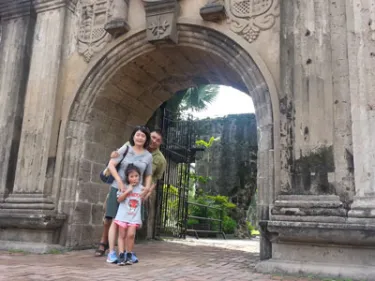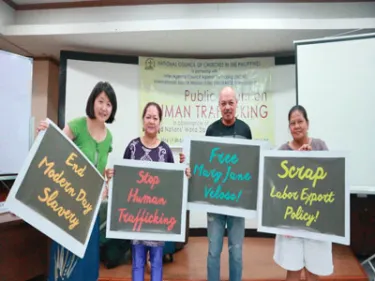Beginnings of a New Day
A letter from Rev. Cathy Chang serving in the Philippines
Beginnings of a New Day
“Juan and Cathy, our sister and brother in Christ from across the great ocean, you have come to our land during a time of great crisis. Our land and our people, forced into mere objects of profit, are left exploited and raped. Our land is a silent victim, dying slowly of rampant deforestation and chemical intensive agriculture. Our people suffer in fear and pain with no food to eat and no homes to shelter their families. Their resources prohibit education and medicine for their children. Their lives are driven into a numbing existence and left with little hope and dignity because inequality and selfishness prevail. This is our land. We are its people. We welcome you in our struggle for peace, justice and development. We welcome you in our quest for a new heaven and a new earth. We welcome you to the new day coming...”

Being on the receiving end of such words of welcome and invitation is humbling. At the end of July the Commission on Christian Unity and Union (CCUU) of the United Church of Christ in the Philippines (UCCP) invited our family to participate in its welcoming ritual as part of the morning worship service before the business meeting. While striving for that “new day,” our family still has much to learn about the “nowadays” situation for the Philippines and the people.
Now that we have been here almost six months, our work, school and family life have new routines. Juan serves as “professional Dad” and shares his love of board games with new friends. Aurélie enjoys her new classmates and school as a pre-K student. I am learning to adjust to more family time and a less structured work environment. Learning Tagalog, attending different events and meeting new people does fill up my schedule. As a local church pastor I had a built-in community. Now I am attempting to develop relationships and understand peoples’ expectations within a new context. Thankfully in this very different work environment and structure I have slowly started to make connections with people.

In early August the National Council of Churches in the Philippines, in partnership with International Justice Mission (IJM), the Inter-Agency Council Against Trafficking, and Migrante International, hosted a Public Forum on Human Trafficking. This was my first formal opportunity to learn about human trafficking in the Philippines and to meet staff members from various organizations. Migrante International focuses on the rights of overseas Filipino workers (OFW) and IJM specializes in rescuing trafficking victims who are involved in commercial and online sexual exploitation. Although each organization is different, they came together for a forum to strengthen their joint efforts against human trafficking. After attending this event I am looking forward to follow-up visits with several organizations.
Another opportunity I had recently was to join with graduate students from the Democratic Republic of Congo, Ghana, Tanzania, Sri Lanka, China, and the Philippines who are learning about “diaconic management.” I participated in their weeklong Manila field study. These students are also social workers, NGO workers, pastors, and church leaders seeking to address the concerns of church and society such as youth empowerment, HIV/AIDS, and children with developmental disabilities. Through information sessions from various organizations and site visits I learned more about the concerns such as environmental destruction, poverty, and human rights that were expressed in our UCCP welcome into partnership ritual.
We visited one faith-based organization called the Sinag Kababaihan Center, which serves and advocates for women who support themselves by working as street walkers/sex workers. Desperate for work, many women leave the provinces only to find themselves without previously promised opportunities in the city. During our site visit an ex-street walker shared her story. Her first night of working included arrest, jail and “protection” by a police officer as long as she granted him sexual favors. Fortunately she didn’t work long as a street walker because she heard from other women that there was hope and help through the Sinag Kababaihan Center, thanks to the prominent story of Marilyn, a former streetwalker who is now the only paid staff member there. After completing my language study classes I will begin working with Marilyn at the Center.
Later we traveled to a club to speak with sex workers. It was my first time to visit any nightclub in the Philippines and the first time to speak directly with sex workers. On the way to the club I was shocked to learn that I could walk there from the language study center where I recently started learning Filipino. Upon our arrival, solo women danced slowly and seductively on stage for an audience of five to seven men. Caught between personal discomfort and professional experience as graduate students, several of the students discussed their ambivalence as we settled into our seats. Stillness and shiftiness and some combination of both in their body language marked the different ways that they were taking in this experience.
Minutes later, amidst pulsing lights and music, young women dressed in uniform fluorescent orange sheaths and black shorts synchronized their movements. Moving with uniformity but expressing their individuality through hair style and shoes, each woman wore a golden pin with a number reminding us that this was a business transaction. Mostly through mouth-cupped hand-to-ear conversation our group managed bits of conversation with one of the club managers. What is your name? What do you do? How long have you worked here? How many girls work on a typical night? How long does a typical girl stay at this club? How much money does each girl make?
Later I realized that I must have sounded like a business person. I realize now that I was still trying to put distance between myself and this club manager and put aside my emotions. I unconsciously rationalized that what these visiting students experienced through this brief visit I will experience over several years, so I can afford that distance. I didn’t think to ask personal questions about these individuals, their ambitions, their life stories, about them as persons. Just as God is inviting me to feel sadness, ask hard questions, wonder what will help, get angry about all that I am experiencing in the Philippines, I know now that this invitation begins with one person, one encounter, one organization, at a time. Partnering with the UCCP is not only about being a student of the culture, society and church. It is also about meeting people where they are, understanding where they’ve been, and holding on to God’s ultimate promise of the fullness of life and striving together toward that new day.
An early September bombing in Davao City killed over 10 people and wounded over 70 people. More lives are claimed daily in the Philippine war against drugs. Pray for the Philippine people and government to find a just and peaceful way.
Thank you for joining with our family on God’s mission in the Philippines and southeast Asia. Your emails, letters, and financial support help keep us going and focused on that new day that will dawn for our brothers and sisters throughout Asia. We invite you to join us through your prayers and financial gifts as we continue our ministry.
Cathy, Juan & Aurélie
Please read below for an important note from Hunter Farrell:
“Do not fear, for I have redeemed you; I have called you by name, you are mine.When you pass through the waters, I will be with you; and through the rivers, they shall not overwhelm you;
when you walk through fire you shall not be burned, and the flame shall not consume you. (Isaiah 43:1b-2, NRSV)
Dear Friend of World Mission:
Thank you for your prayers and for your financial support of Cathy and Juan this year, and any previous year. I know from my 15 years as a Presbyterian mission co-worker that your prayerful financial support has meant the world to them.
Even as I thank you, I want to let you know that this is a critical time for churches and individuals to commit themselves to support Cathy and Juan. Our global church partners greatly value their service and you well know how important this ministry is in building connections between the body of Christ in the U.S. and the Philippines.
We have historically relied on endowment interest and the general offering from churches to sustain the vital work of all of our mission workers. Those sources of funding have greatly diminished, and it is only through the over-and-above gifts of individuals and congregations that we are able to keep Cathy and Juan doing the life-giving work God called them to do. A year ago, in May of 2015, for the first time in recent history, we had to recall some mission workers due to a lack of funding. We communicated the challenge to you and you responded decisively and generously. Through your response, we heard the Spirit remind us, “Fear not!”.
Today, I’m asking you to consider an additional gift for this year, and to increase the gift you may consider for 2017. Sending and support costs include not only salary but also health insurance and retirement contributions, orientation, language training, housing, travel to the country of service, children’s education, emergency evacuation costs, and visa/passport costs.
My heartfelt thanks for your prayers and support of our Presbyterian mission co-workers. In the coming season, we will celebrate God’s sending of the Christ child, the source of the good news we share. May you experience anew the hope, peace, joy, and love that are ours because “perfect love casts out fear” (1 John 4:18).
Thank you for saying “yes” to love.
With you in Christ,
Hunter Farrell
Director, World Mission, Presbyterian Church (U.S.A.)
